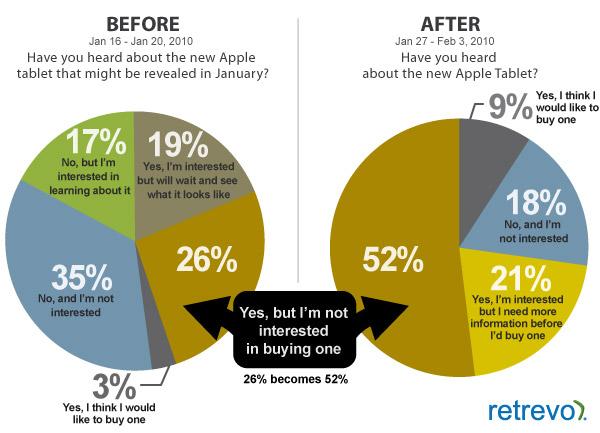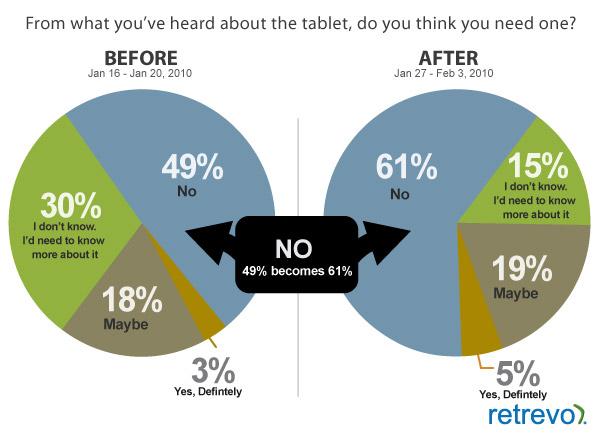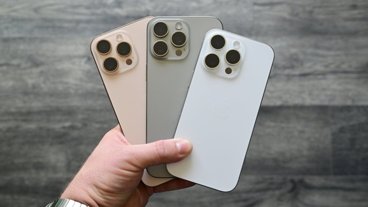A survey of more than 1,000 randomly selected customers at the online marketplace Retrevo found that 52 percent of respondents have heard of Apple's iPad, but are not interested in buying one. Another 18 percent said they had not heard of the product, but also were not interested.
Prior to the product's unveiling, 26 percent of those surveyed had heard of the then-mythical "Apple tablet," but were not interested in buying one. That total doubled after the iPad's official Jan. 26 unveiling.
"It's the apps that sell smartphones like the iPhone and it could very well be those same apps that motivate buyers to run down to the Apple Store and get in line to buy a shiny new iPad," the company said. "Whether this device becomes a big hit is anyone’s guess but based on this study it sure looks doubtful."
The survey found that awareness of the iPad is high — more than 80 percent of respondents said they had heard of Apple's product. Of those, 21 percent said they need more information on the iPad before they purchase, and 9 percent said they would likely buy one. The company even tracked conversations on Twitter, and found the iPad announcement rivaled talk of the U.S. presidential State of the Union address, held the same day.
The survey results suggest consumers may not see how the iPad would fit into their lives. While 5 percent said they "definitely" need one, 61 percent said they do not think they need an iPad.
In addition, the $130 premium cost to add 3G connectivity was found to be a turn-off for potential buyers. While 12 percent would pay the extra money for 3G and 29 percent would think about it, 59 percent of respondents said they would not pay any extra for 3G.
Retrevo's latest survey was conducted between Jan. 27 and Feb. 3 following Apple's announcement of the iPad, starting at $499 and scheduled to arrive in late March. The results were compared to a previous study done between Jan. 16 and Jan. 20, before the iPad was unveiled.
Last week, another study of medical professionals found that one in five physicians said they are likely to purchase an iPad. Of more than 350 clinicians surveyed, 9 percent said they plan to buy the product immediately, while another 13 percent intend to purchase one in the first year.
Analysts mostly expect the iPad to have a moderate but successful start, selling between one million and five million in its first year. The product's aggressive $499 starting price is seen to be its greatest asset. One analyst believes a sales "catalyst" must emerge — as the iTunes Store did for the iPod, and App Store for the iPhone — before the iPad sees significant growth.
 Katie Marsal
Katie Marsal








-m.jpg)






 Charles Martin
Charles Martin
 Wesley Hilliard
Wesley Hilliard
 Stephen Silver
Stephen Silver
 William Gallagher
William Gallagher

 Marko Zivkovic
Marko Zivkovic
 Andrew Orr
Andrew Orr
 Amber Neely
Amber Neely







407 Comments
Ouch!
Did they poll the exact same pool of people before AND after? If not then this really doesn't amount to much because you don't see the opinion shift within the same body.
Lost interest AFTER unveiling? I lost interest WHILE they were unveiling....
no multitask, no flash, no camera, no interest....
So? How many more private jets from Palo Alto to NYC and pastas in basement restaurants?
Of course interest will wane until after the product is actually available for purchase and use.
I expect it will be several months before word of mouth gains momentum of how enjoyable and functional and useful the iPad is, and the Apps will be pouring in and adding to the desirability.
And in a year when more features are added sales will really pick up.
Ppl LOVE Skype and iChat. The cellular networks are probably not able to handle that load yet. But when that is available it will be a big sale instigator!
Plus all the new sensors and functions of the future will help. It will evolve even more rapidly than the iPhone.